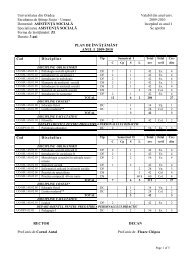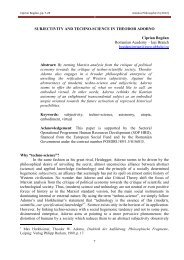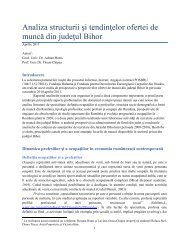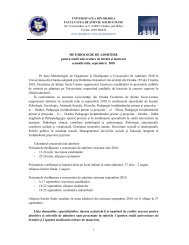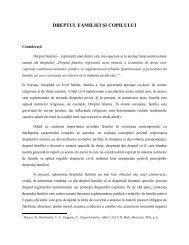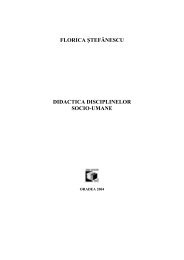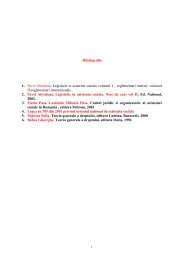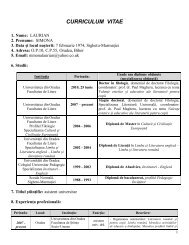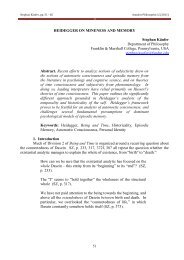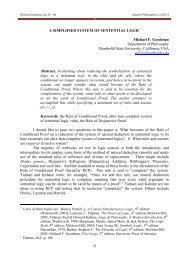the romantic theory of understanding and ... - socioumane.ro
the romantic theory of understanding and ... - socioumane.ro
the romantic theory of understanding and ... - socioumane.ro
You also want an ePaper? Increase the reach of your titles
YUMPU automatically turns print PDFs into web optimized ePapers that Google loves.
Annales Philosophici 6 (2013) Navid Afsharzadeh, pp. 11-18<br />
thinking, forever puts <st<strong>ro</strong>ng>of</st<strong>ro</strong>ng>f <st<strong>ro</strong>ng>the</st<strong>ro</strong>ng> final word. Millan-Zaibert puts it in this way: "I<strong>ro</strong>ny is a tool<br />
that lifts <st<strong>ro</strong>ng>the</st<strong>ro</strong>ng> rigid confines <st<strong>ro</strong>ng>of</st<strong>ro</strong>ng> language."(Millan-Zaibert 2007 p.168)<br />
We should also consider ano<st<strong>ro</strong>ng>the</st<strong>ro</strong>ng>r significant factor <st<strong>ro</strong>ng>of</st<strong>ro</strong>ng> Schlegel's turn toward<br />
fragmentary writing, namely his conviction regarding <st<strong>ro</strong>ng>the</st<strong>ro</strong>ng> failure <st<strong>ro</strong>ng>of</st<strong>ro</strong>ng> philosophies that begin<br />
with a first principle (such as Descartes, Kant <st<strong>ro</strong>ng>and</st<strong>ro</strong>ng> Fichte). He believed that such philosophies<br />
will end in one-sidedness <st<strong>ro</strong>ng>and</st<strong>ro</strong>ng> finitude, <st<strong>ro</strong>ng>and</st<strong>ro</strong>ng> <st<strong>ro</strong>ng>the</st<strong>ro</strong>ng>se very first principles will p<strong>ro</strong>vide <st<strong>ro</strong>ng>the</st<strong>ro</strong>ng> basis for<br />
<st<strong>ro</strong>ng>the</st<strong>ro</strong>ng>ir ultimate collapse. As Manfred Frank suggests, "The beginning <st<strong>ro</strong>ng>of</st<strong>ro</strong>ng> philosophy is <st<strong>ro</strong>ng>the</st<strong>ro</strong>ng>refore<br />
not a positive principle grasped by knowledge, but ra<st<strong>ro</strong>ng>the</st<strong>ro</strong>ng>r <st<strong>ro</strong>ng>the</st<strong>ro</strong>ng> feeling <st<strong>ro</strong>ng>of</st<strong>ro</strong>ng> a lack <st<strong>ro</strong>ng>of</st<strong>ro</strong>ng><br />
knowledge."(qtd. In. Corby 2010 p.754) Thus Frank justifies fragment in this way: "F<strong>ro</strong>m <st<strong>ro</strong>ng>the</st<strong>ro</strong>ng><br />
fragmentary universe <st<strong>ro</strong>ng>the</st<strong>ro</strong>ng>re results no system but “asystasy,” “instability”,<br />
“disharmony”."(Frank 2004 p.211)<br />
Schlegel, however, was not looking merely after recognizing <st<strong>ro</strong>ng>the</st<strong>ro</strong>ng> finitude <st<strong>ro</strong>ng>of</st<strong>ro</strong>ng> human<br />
consciousness as a negative feeling <st<strong>ro</strong>ng>and</st<strong>ro</strong>ng> stopping at this point. Ra<st<strong>ro</strong>ng>the</st<strong>ro</strong>ng>r, he intended to revive a<br />
positive attitude too. Of course he believed that this could not be fulfilled in philosophy.<br />
Therefore he suggests, "Whatever can be done while poetry <st<strong>ro</strong>ng>and</st<strong>ro</strong>ng> philosophy are separated has<br />
been done <st<strong>ro</strong>ng>and</st<strong>ro</strong>ng> accomplished. So <st<strong>ro</strong>ng>the</st<strong>ro</strong>ng> time has come to unite <st<strong>ro</strong>ng>the</st<strong>ro</strong>ng> two"; or in Fragment 48 <st<strong>ro</strong>ng>of</st<strong>ro</strong>ng><br />
Ideas, he writes: "Where philosophy ends, poetry must begin". As Corby comments, "For<br />
Schlegel <st<strong>ro</strong>ng>the</st<strong>ro</strong>ng>n, <st<strong>ro</strong>ng>the</st<strong>ro</strong>ng>re is a clear need for philosophy to embrace literary form". (Corby 2010<br />
p.755) This is precisely <st<strong>ro</strong>ng>the</st<strong>ro</strong>ng> poetic aspect <st<strong>ro</strong>ng>of</st<strong>ro</strong>ng> <st<strong>ro</strong>ng><strong>ro</strong>mantic</st<strong>ro</strong>ng> fragment that suspends <st<strong>ro</strong>ng>the</st<strong>ro</strong>ng> determinate<br />
<st<strong>ro</strong>ng>and</st<strong>ro</strong>ng> definite moment <st<strong>ro</strong>ng>of</st<strong>ro</strong>ng> text by its non-determining character.<br />
Therefore Schlegel paradoxically, brings an objective <st<strong>ro</strong>ng>and</st<strong>ro</strong>ng> real element into<br />
philosophy <st<strong>ro</strong>ng>of</st<strong>ro</strong>ng> idealism, for he believed that idealism extends to where we behold our lack <st<strong>ro</strong>ng>of</st<strong>ro</strong>ng><br />
success in determining <st<strong>ro</strong>ng>the</st<strong>ro</strong>ng> world. Years before <st<strong>ro</strong>ng><strong>ro</strong>mantic</st<strong>ro</strong>ng>ism's reviving back to philosophical<br />
focus, Walter Benjamin recognized <st<strong>ro</strong>ng>the</st<strong>ro</strong>ng> same point. He writes: "Under <st<strong>ro</strong>ng>the</st<strong>ro</strong>ng> name <st<strong>ro</strong>ng>of</st<strong>ro</strong>ng> criticism,<br />
<st<strong>ro</strong>ng>the</st<strong>ro</strong>ng> Romantics at <st<strong>ro</strong>ng>the</st<strong>ro</strong>ng> same time confessed this inescapable insufficiency as necessary".<br />
Schlegel holds that, despite <st<strong>ro</strong>ng>the</st<strong>ro</strong>ng> rising <st<strong>ro</strong>ng>of</st<strong>ro</strong>ng> negativity f<strong>ro</strong>m philosophy, we could have a positive<br />
experience <st<strong>ro</strong>ng>of</st<strong>ro</strong>ng> <st<strong>ro</strong>ng>the</st<strong>ro</strong>ng> Absolute, although it could not be grasped by human knowledge.<br />
Fragment: Incompleteness – Unworking<br />
Although <st<strong>ro</strong>ng>the</st<strong>ro</strong>ng> <st<strong>ro</strong>ng><strong>ro</strong>mantic</st<strong>ro</strong>ng> fragmentary writing is <strong>ro</strong>oted in <st<strong>ro</strong>ng>the</st<strong>ro</strong>ng>ir reaction against<br />
systematic thought, <st<strong>ro</strong>ng>and</st<strong>ro</strong>ng> despite <st<strong>ro</strong>ng>the</st<strong>ro</strong>ng>y acknowledge <st<strong>ro</strong>ng>the</st<strong>ro</strong>ng> incompleteness as <st<strong>ro</strong>ng>the</st<strong>ro</strong>ng> true nature <st<strong>ro</strong>ng>of</st<strong>ro</strong>ng><br />
human consciousness, we could not take this as <st<strong>ro</strong>ng>the</st<strong>ro</strong>ng>ir mere giving up to <st<strong>ro</strong>ng>the</st<strong>ro</strong>ng>se barriers. The<br />
<st<strong>ro</strong>ng><strong>ro</strong>mantic</st<strong>ro</strong>ng>s accepted <st<strong>ro</strong>ng>the</st<strong>ro</strong>ng> "ideal" <st<strong>ro</strong>ng>of</st<strong>ro</strong>ng> a system, or system as a mere regulative idea in a Kantian<br />
sense. They regarded philosophy as an infinite longing <st<strong>ro</strong>ng>and</st<strong>ro</strong>ng> app<strong>ro</strong>ximation to truth. Thus, <st<strong>ro</strong>ng>the</st<strong>ro</strong>ng><br />
<st<strong>ro</strong>ng><strong>ro</strong>mantic</st<strong>ro</strong>ng> fragment in its constant p<strong>ro</strong>cess <st<strong>ro</strong>ng>of</st<strong>ro</strong>ng> self-creation <st<strong>ro</strong>ng>and</st<strong>ro</strong>ng> self-destruction, while having<br />
self-awareness <st<strong>ro</strong>ng>of</st<strong>ro</strong>ng> its incompleteness, must not ever stop without getting close to its ideals, <st<strong>ro</strong>ng>and</st<strong>ro</strong>ng><br />
in this way prevent us f<strong>ro</strong>m falling into <st<strong>ro</strong>ng>the</st<strong>ro</strong>ng> abyss <st<strong>ro</strong>ng>of</st<strong>ro</strong>ng> nihilism. Therefore, <st<strong>ro</strong>ng>the</st<strong>ro</strong>ng> inherent<br />
incompleteness <st<strong>ro</strong>ng>of</st<strong>ro</strong>ng> fragment turns into an exigency which lead <st<strong>ro</strong>ng>the</st<strong>ro</strong>ng> work to an unending<br />
becoming. Maurice Blanchot believed that "<st<strong>ro</strong>ng>the</st<strong>ro</strong>ng> <st<strong>ro</strong>ng><strong>ro</strong>mantic</st<strong>ro</strong>ng> work remains workless, unworked<br />
[desoeuvre]"(qtd. In. A.Strathman p.29); it exhibits a certain self-withdrawal or self-reserve.<br />
(Ibid. p. 29)<br />
Therefore <st<strong>ro</strong>ng>the</st<strong>ro</strong>ng> uniqueness <st<strong>ro</strong>ng>of</st<strong>ro</strong>ng> fragment is that it is a genre which is both complete <st<strong>ro</strong>ng>and</st<strong>ro</strong>ng><br />
incomplete or according to Critchley "It is a form that embodies interruption within<br />
itself"(Critchley 2004 p.124). August Schlegel formulates this idea in ano<st<strong>ro</strong>ng>the</st<strong>ro</strong>ng>r way; in <st<strong>ro</strong>ng>the</st<strong>ro</strong>ng><br />
A<st<strong>ro</strong>ng>the</st<strong>ro</strong>ng>naeum fragment no.214 he writes: "No matter how good a lecture delivered f<strong>ro</strong>m <st<strong>ro</strong>ng>the</st<strong>ro</strong>ng><br />
height <st<strong>ro</strong>ng>of</st<strong>ro</strong>ng> <st<strong>ro</strong>ng>the</st<strong>ro</strong>ng> podium might be, <st<strong>ro</strong>ng>the</st<strong>ro</strong>ng> greatest joy is gone because one can’t interrupt <st<strong>ro</strong>ng>the</st<strong>ro</strong>ng><br />
speaker; so too with <st<strong>ro</strong>ng>the</st<strong>ro</strong>ng> didactic writer."(qtd. In A.Strathman 2006 pp.40-41) <st<strong>ro</strong>ng>and</st<strong>ro</strong>ng> this is <st<strong>ro</strong>ng>the</st<strong>ro</strong>ng><br />
16



